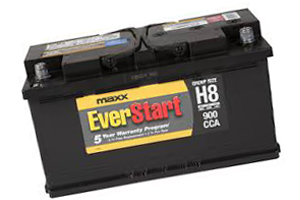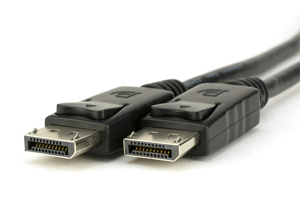Connector: Types, Components, How They Work, and Applications
Author:admin Date: 2025-03-21 03:53 Views:156
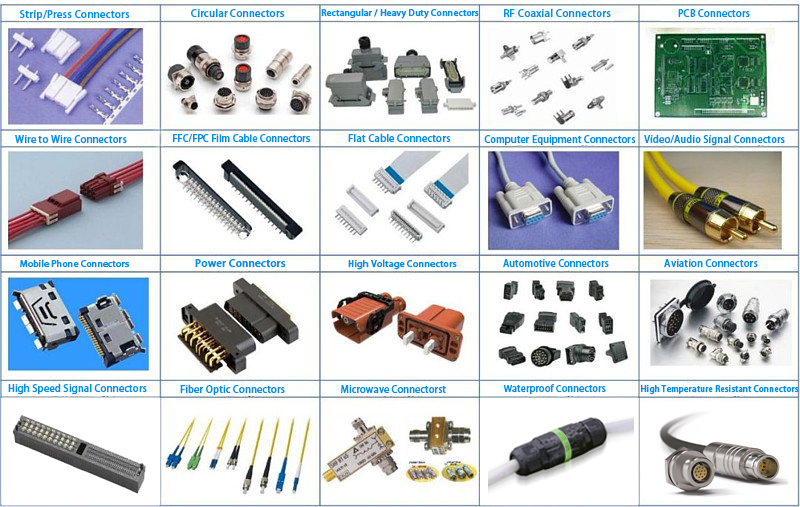
Introduction
Interconnectivity is not new in our world today. You are likely to come across many connections, whether for electrical power transmission, data transmission, or any other application. What is common in all these applications is the use of connectors.
A connector is an electrical device used for coupling terminals depending on an application. Once the connection is made, it allows for the temporary flow of electricity, data, and other signals between terminals.
For example, you can have a connector for making electrical terminations while another for video and audio signal transmission.
Components of a Connector
Whether you are buying automotive wire connectors or fiber connector types, they seem to have a similar construction. The first thing you will see is the housing. This is the outer structure vital for protecting the internal components. It also helps with ensuring there is a stable connection.
The housing is mostly made of molded plastic or ceramics. Manufacturers use these materials to prevent chances of short-circuiting or electrical contact from nearby connections.
The next component of a HDMI to USB connector or any other type of connector will be the terminals. They are also called pins, sockets, or contacts. These are what make the electrical connection. The terminals are made of metal or it can be any other conductive material.
Depending on the connector type, you can get additional accessories as part of the connector. Such include board locks, mounting ears, latches, and more. You may get some accessories that guide you on the proper orientation of the connector to ensure you always get it right.
Some come with seals as well. Seals work to ensure moisture does not get into the connector once it is set up correctly.
How Connectors Work
A connector will work only if there is mating. In this case, it means the male and female connectors of the terminals are brought together, leading to a secure electrical connection.
Once there is a connection, the metal contacts in the connectors allow the flow of electricity or data. It is that simple. If you uncouple the connectors, they cease to work.
You also get a housing with connectors that protect the terminals in the connectors from short circuits or damage.
Types of Connectors
Expect to come across a wide range of connectors in the market right now. This includes audio and video connectors, automotive connectors, and many others, as we shall see in detail below.
Audio and Video Connectors

These connectors are made to offer high clarity and high-speed transmission of audio and video signals.
The common options under the audio and video connectors include combo jacks, DIN connectors, DisplayPort connectors, HDMI connectors, DVI receptacles, USB connectors, and much more.
These connectors can also have improved features to stand out. Options include connectors that have better EMI shielding and enhanced board retention to ensure reliable connections for demanding applications.
Automotive Connectors

Such wire connectors are recommended for cars, trucks, buses, and other types of automotive applications. Here, you will come across automotive connector accessories, automotive terminals, automotive housings, headers, and data connectivity systems.
One thing about such connectors is that they are built to withstand the tough conditions that a car or truck has to operate in. You are left with confidence, knowing your electronics will keep working all the time.
Circular Connectors

As the name suggests, such a connector comes with a cylindrical shape. You will also notice that it contains multiple pins inside the connector that are plugged into the respective port for data or electrical signal transmission.
Looking at the circular connector design, you will see how it is built to offer better durability and maintain performance even in harsh conditions. Applications for such connectors include instrumentation, transportation, medical, defense, aerospace, and broadcasting.
D-shaped Connectors
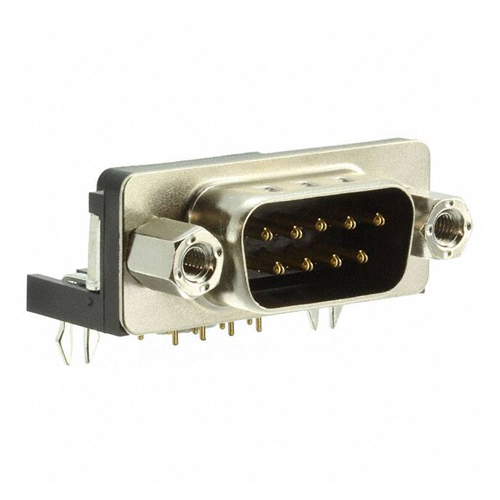
You may have come across connectors with a metal casing shaped into the letter D. These connectors are mostly used for power and signal transmission in communication equipment. You may also find them connecting peripheral devices to personal computers.
The D-shaped connectors are mostly rugged making them find more applications in commercial and military spaces.
Dock Connectors

These connectors are designed to ensure a proper grip once you have inserted them into the right port. You usually get receptacles and side latches that help you know you are inserting the correct way and hold the connection strongly.
These connectors are common in tablet computers, mobile devices, and notebook computers. Manufacturers can sometimes guarantee over 10,000 plug-in mating cycles without worrying the connector might break.
Fiber Optic Connector

These are quite common connectors in the market, especially for networking applications. Notable examples include rugged fiber connectors, standard fiber connectors, backplane fiber optics connectors, and more.
These connectors are easy to work with even while in the field. Once set up, they give reliable performance even in harsh outdoor environments. Always look for a brand that makes quality fiber optic connectors to ensure signal strength is not affected.
Lighting Connectors
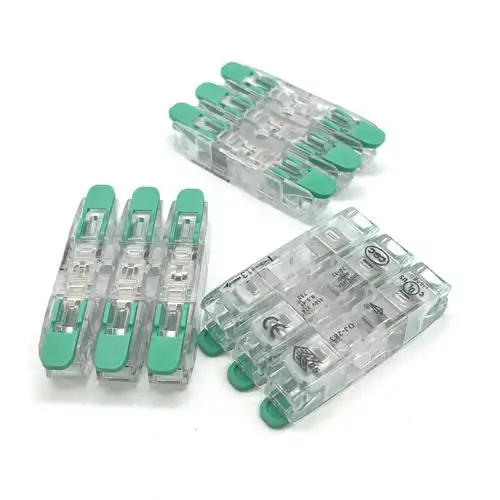
Illumination is quite important and that is why you get the lighting connectors. Depending on the lighting technology, expect to come across various options in the market. You can find options such as ballast connectors, plug-and-socket lighting connectors, LED holders, poke-in connectors, and more.
The design varies based on the application. Some are simple, while others can be complicated as they might have more features. As such, get the right connector depending on the lighting application. For example, if it is an outdoor lighting application, get the right connectors meant for outdoor use.
RJ Connectors

These are also called the modular connectors. They are designed to ensure a secure and reliable connection mostly for networking devices. The unique size and design of the connectors ensure there is no mismating which sometimes could result in issues.
Common examples include RJ45 connectors, RJ11 connectors, RJ14 connectors, RJ point five connectors, and MRJ21 connectors. You can expect to find more similar connectors depending on the manufacturer.
PCB Connectors
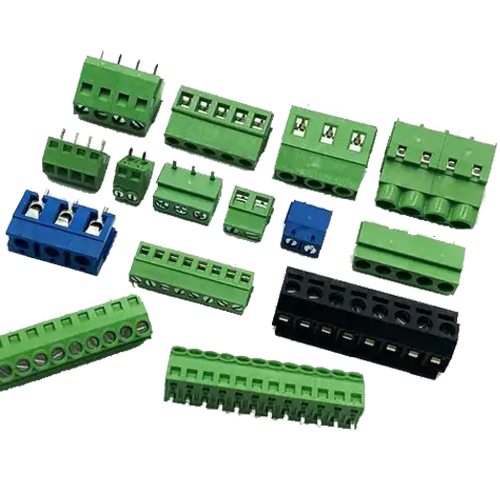
This is a big umbrella for many electrical connectors that can be mounted on a PCB. You can get signal and power connectors all set up this way. It all depends on the application. These connectors usually provide exceptional performance for various applications.
Examples of such connectors include backplane connectors, board-to-board connectors, card edge connectors, board-in connectors, memory card connectors, and wire-to-board connectors.
Pluggable I/O Connectors

This type of wire connector accelerates data transmission from one device to another. They are designed to offer more speed, flexibility, and data density. The result is an efficient and reliable connection, depending on the user.
These connectors are common in thermal systems and communication applications where reliability and performance are critical. Examples include CDFP, OSFP, X2, and CFP connectors.
Power Connectors

The power connectors are designed to reliably provide power to where they are connected. Power connectors come in many shapes and designs. It is critical to always choose the correct one depending on port configuration.
Also, the connectors can either be DC or AC. So, depending on the application, make sure you choose the correct one for the job. The common options include busbar connectors, panel and PCB outlets, power terminals, circular power connectors, and rectangular power connectors.
RF Connectors

These are also called RF coaxial cable connectors. They are designed to transmit analog signals while also minimizing radio frequency signal losses. Expect to come across this connector with coaxial cables because of the shielding these cables provide.
These connectors also come in many sizes. They can also be made of strong materials so that they can handle harsh environments. Also, for the setup, you need the right crimping or clamp termination tool for ease of installation.
How to Choose a Connector Type
A good connector is critical for a device to work. Whether you are buying a USB connector or a VGA connector, it is crucial to get it right always. Here are some ideas on what to consider to buy the best connector.
The Application
Consider where or how you will be using the connector. This determines which connector you get to buy. That is how you end up buying battery connectors or coaxial cable connectors because that is what you need. First, identify the application and then choose appropriately.
Operating Conditions
You may have noticed that some connectors are push and pull while others are threaded. The threaded connectors are designed to work in environments with vibrations and shock. This means they will not come loose easily as compared to the push and pull connectors.
Does the system work in high temperatures? These are some of the conditions to keep in mind when looking for connectors built specifically for such applications.
Ingress Protection Capability
You may come across the Ingress Protection or IP factor on connectors. This determines how well the connector is protected against external factors such as oils, water, and dust. Some connectors can handle occasional sprinkles of water, while others must be watertight, depending on the use. So, look at how the connector is built to see if it will work well for your needs.
The Connector Size
This is very important as connectors have specific sizes. For example, if you choose the RJ45 connector, ensure it is meant for that particular use. The RJ45 connector cannot be used in place of RJ11 or RJ14 connectors. Always research the proper size of the connector needed to work correctly.
Mating Cycles
Electrical wire connectors come with mating cycles through which they can survive. You can come across this information in the product description. You want a connector with a higher number of mating cycles in case you keep mating and unmating it.
However, some applications are where you connect the connector and forget about it. In such a case, the mating cycles might not be too critical.
Overall Durability
Whether it is an RCA connector or a USB-C connector, durability is still as important. Look at the build quality to see how well the connector can withstand regular use. Also, does the connector follow industry standards? This ensures it can live up to your expectations as you keep using it.
Review reviews about customers’ connectors to see how well they served them. A good warranty can also say a lot about the overall durability of the connectors.
Conclusion
Connectors remain critical in many applications. What is important is always to get the right connector for the job. That is why they are available in several sizes so that you get a proper fit. If you face challenges, consider cleaning the contacts or checking if the connector has a proper fit to keep the device working correctly. Also, always pick connectors from certified brands ensuring they live up to your expectations regarding their performance.

